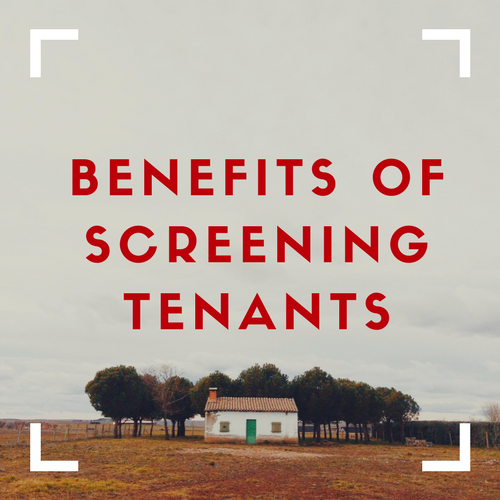Question, if a potential tenant does not want you to screen them but says they will pay 6 months up front, would you do it? I hope you answered this question with an immediate no, never, no way.
In so many cases, those who do not want to fill out an application or give their information to properly run credit and background checks usually have something to hide. Some criminals take advantage of the landlord by offering them cash upfront and then continue to do illegal activities within the home. Others will give you false information.
This leads me to why it is so important to properly screen every potential renter consistently. If you do this correctly, you will see the many benefits of screening tenants.
These benefits include but are not limited to:
- Protecting your Asset(s)
- Increase Cash Flow
- Longer Tenancy
Let’s go into each of these in more detail.
Protecting your Asset(s)
Your real estate asset is hopefully appreciating over time. The better you take care of the property the more likely the home will appreciate at a higher level. Of course if you are not the one living in the home, it is imperative that you find high quality tenants that will take care of your asset.
In additional to properly screening your renters, you can also help protect your asset by adding additional tenant responsibility language into the rental agreement. For example, every rental agreement should have the following:
- Names of All Tenants over the age of 18
- Whether the tenants are just roommates, married or unmarried, it is imperative that each person over the age of 18 living in your rental be on the rental agreement. This ensures all parties are aware of the rules and terms of the agreement and you can seek legal action to collect the full amount of rent from any of your tenants.
- Limits on Occupancy
- You don’t want one of your tenants moving in their friends or relatives without your written consent. Setting a limit on the amount of adults that can live in your home helps with the screening process and helps protect you and the asset.
- No AirBnB/ Short Term / Sublease Clause
- Short term rentals for landlord is becoming a real problem. Sites like AirBnb and VRBO make it easy to “share” your rental property with people who are looking for short term stays. The problem is, just like a hotel, when you have many people staying in a property, no more likely it is to get damage. if your renter is doing this without your knowledge, and you don’t have language in your lease forbidding it, you could be liable for anything that happens on the property, your HOA could fine you and your property could be damaged. Here are a few sample paragraphs you can put into your lease agreement to help protect you:
- No Subletting: Tenant has no right to sublease or assign Tenant’s rights under the Lease without the written consent of Manager or Landlord.
- ASSIGNMENT AND SUBLEASING. Tenant(s) shall not assign this Agreement, or sublet or grant any license to use the Premises or any part thereof without the prior written consent of Landlord. Consent by Landlord to one such assignment, subletting or license shall not be deemed to be a consent to any subsequent assignment, subletting or license. An assignment, subletting or license without the prior written consent of Landlord or an assignment or subletting by operation of law shall be absolutely null and void and shall, at Landlord’s option, terminate this Agreement and start the eviction process of all Tenant(s) and occupants.
- If subletting is approved by the Landlord, a one-time fee of THREE HUNDRED DOLLARS ($300.00) PER SUBLET, is assigned to the lease. All subletting individuals are required to submit an application to the Landlord for evaluation and screening. Landlord reserves the right to reject any sublessee that does qualify. If any sublets are initiated by Tenant(s) without the prior written consent of the Landlord, for each individual sublet, Tenant(s) will be assigned and responsible for the subletting fee, for each sublet, spanning the entire term of this Agreement.
- Assignment or Subletting: Tenants shall not assign or sublet any room at ADDRESS or allow any other person to occupy the leased premises without Landlord’s prior written consent. Tenants are prohibited to use programs like Airbnb or RelayRides to rent any part of the property including the parking space in the garage.
- Short term rentals for landlord is becoming a real problem. Sites like AirBnb and VRBO make it easy to “share” your rental property with people who are looking for short term stays. The problem is, just like a hotel, when you have many people staying in a property, no more likely it is to get damage. if your renter is doing this without your knowledge, and you don’t have language in your lease forbidding it, you could be liable for anything that happens on the property, your HOA could fine you and your property could be damaged. Here are a few sample paragraphs you can put into your lease agreement to help protect you:
- Term of Tenancy
- Is the rental a month-to-month, 6 month, 1 yr term? Have the correct term within the written lease agreement. If no term is in agreement or you forget to renew the agreement with new terms of tenancy, most states look at that as a month to month agreement.
- Rent Amount
- This section tells the tenants how much the month rent is, when it is due, when it is late and any acceptable ways to pay. Cash, Check, Credit Card, ACH, etc.
- Deposits and Fees
- Make sure you know your state’s maximum deposit amount allowed. Also, be clear on how you can use the deposit if things are damaged. When and how you will return the deposit if everything is ok with the property and if there are no late payments. Also state any legal non-returnable fees like pet deposits, etc.
- It is also important to have a walk-through inspection before and after the tenant moves in. Take pictures of everything and have the tenant sign-off of the condition of the property before they move in.
- Repairs and Maintenance Responsibilities
- Here are some sample language to help set expectations with the tenant on what they are responsible for when it comes to repairs and maintenance.
- Tenant Obligations
- (a) Tenant’s Obligations to Maintain. Tenant, at Tenant’s expense, shall perform all repairs and replacements and all routine maintenance necessary to maintain the interior, non-structural components of the Premises and all major building systems in good repair and proper working condition, normal wear and tear excepted.
- (b) Tenant’s Obligations to Repair Damage. Tenant shall reimburse Landlord upon demand for all costs and expenses incurred by Landlord for the repair of any damage to the Premises caused by the negligence or willful misconduct of Tenant or any Tenant Party.
- (c) Tenant’s Obligations to Notify. Tenant shall promptly report in writing to Landlord any defective condition known to Tenant that Landlord is required to repair
- Tenant and Landlord will conduct a walk-through of the Rental Property before Tenant moves in to examine the premises. Tenant will examine the Rental Property, including appliances, fixtures, carpets, paint, etc. and considers them to be safe and in clean condition and repair unless otherwise noted in writing to the Landlord within the first week of moving into the premises.
- Tenant is responsible to keep the Rental Property clean, sanitary, and in good condition, and other than ordinary wear and tear, return the Rental Property to Landlord in the same condition as at the beginning of the lease.
- Tenant is required to promptly notify Landlord of any dangerous conditions or defects found in the Rental Property, or arising during the term of this Agreement, whether pre-existing, caused by Tenant, minor children (if any), or guests, and whether negligently or intentionally caused.
- Tenant Obligations
- Here are some sample language to help set expectations with the tenant on what they are responsible for when it comes to repairs and maintenance.
- Entry into Rental Property
- State how much advance notice you will give to the tenant to enter the property for repairs and other legal reasons. A complete state by state chart of when to give notice and reasons for entering can be found here.
- Restrictions on Tenant Illegal Activity
- sdfsf
- Pets
- If you don’t allow pets, specify that in the lease agreement and add a fee if a pet is proven to be on property. If you do allow pets, make sure you describe the terms, weight breed restriction you might have, if any. Sample pet agreement. No pet example language below:
PETS: A. Unless the parties agree otherwise in writing, Tenant may not permit, even temporarily, any pet on the Property (including but not limited to any mammal, reptile, bird, fish, rodent, or insect).
- If Tenant violates this Paragraph or any agreement to keep a pet on the Property, Landlord may take all or any of the following action:
(1) declare Tenant to be in default of this lease and exercise Landlord’s remedies under Paragraph 27;
(2) charge Tenant, as additional rent, an initial amount of $_________ and $_____ per day thereafter per pet for each day Tenant violates the pet restrictions;
(3) remove or cause to be removed any unauthorized pet and deliver it to appropriate local authorities by providing at least 24-hour written notice to Tenant of Landlord’s intention to remove the unauthorized pet; and
(4) charge to Tenant the Landlord’s cost to:
(a) remove any unauthorized pet;
(b) exterminate the Property for fleas and other insects;
(c) clean and deodorize the Property’s carpets and drapes; and
(d) repair any damage to the Property caused by the unauthorized pet.
- When taking any action under Paragraph Landlord will not be liable for any harm, injury, death, or sickness to any pet.
Increase Cash Flow
Data from RealPage found that properly screening renters can also help increase Net Return on Investment by upselling a unit or recommending a less expensive unit based on the applicant’s credit score and debt to income ratio.
The average cost to evict a tenant in around $3,000. For single family homes, having a great tenant by properly screening means you are less likely to incur property damage cost and eviction costs which will directly affect your bottom line and cash flow.
Longer Tenancy
On average, a properly screened tenant using data for credit, background, eviction and other data stays in a single rental property 56% longer. They are 22% more likely to renew the lease and are much less likely to damage the property.















